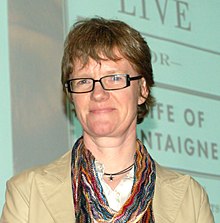Sarah Bakewell
Appearance

Sarah Bakewell (born 3 April 1963) is an author of non-fiction. She currently lives in London.
Quotes
[edit]- From now on, Montaigne would live for himself rather than for duty.
- describing Montaigne’s retirement at age 38, p. 24.
- The great stoic Seneca repeatedly urged his fellow Romans to retire in order to “find themselves,” as we might put it. In the Renaissance, as in ancient Rome, it was part of the well-managed life. You had your period of civic business, then you withdrew to discover what life was really about and to being the long process of preparing for death. Montaigne developed reservations about the second part of this, but there is no doubt about his interest in contemplating life. He wrote: “Let us cut loose from all the ties that bind us to others; let us win from ourselves the power to live really alone and to live that way at our ease.”
- p. 29.
- Seneca, in advising retirement, had also warned of dangers. In a dialogue called “On Tranquility of Mind,” he wrote that idleness and isolation could bring to the fore all the consequences of having lived life in the wrong way, consequence that people usually avoided by keeping busy—that is, by continuing to live life in the wrong way.
- pp. 29-30.
- Finding his mind so filled with “chimeras and fantastic monsters, one after another, without order or purpose,” he [Montaigne] decided to write them down, not directly to overcome them, but to inspect their strangeness at his leisure. So he picked up his pen; the first of the Essays was born.
- p. 31.
- As Seneca put it, life does not pause to remind you that it is running out. The only one who can keep you mindful of this is you.
- p. 37.
- The trick is to maintain a kind of naïve amazement at each instant of experience—but, as Montaigne learned, one of the best techniques for doing this is to write about everything. Simply describing an object on your table, or the view from your window, opens your eyes to how marvelous such ordinary things are. To look inside yourself is to open up an even more fantastical realm.
- p. 37.
- The philosopher Maurice Merleau-Ponty called Montaigne a writer who put “a consciousness astonished at itself at the core of human existence.”
- p. 37.
- Knowing that the life that remained to him could not be of great length, he said, “I try to increase it in weight, I try to arrest the speed of its flight by the speed with which I grasp it. … The shorter my possession of life, the deeper and fuller I must make it.”
- pp. 37-38.
- The peasantry … were the true philosophers of the modern world, the heirs to classical sages such as Seneca and Socrates. Only they knew how to live, precisely because they knew nothing much about anything else.
- p. 51.
- The unusual treatment began soon after his birth, when Micheau was sent to live with a humble family in a nearby village. Having a peasant wet-nurse was normal enough, but Montaigne’s father wanted his son to absorb an understanding of commoners’ ways along with their breast milk, so that be would grow up comfortable with the people who most needed a seigneur’s help. Instead of bringing a nurse to the baby, therefore, he sent the baby to the nurse, and left him there long enough to be weaned. Even at the christening, Pierre [Montaigne’s father] had “people of the lowest class” hold the infant over the font. From the start, Montaigne had the impression at once of being a peasant among peasants, and of being very special and different. This is the mixture of feelings that would stay with him for life. H felt ordinary, but knew that the very fact of realizing his ordinariness made him extraordinary.
- p. 52.
- The hedonistic approach to education did make a difference to him [Montaigne]. Having been guided early in life by his own curiosity alone, he grew up to be an independent-minded adult, following his own path in everything rather than deferring to duty and discipline.
- p. 55.
- Learning should be a pleasure, and children should grow up to imagine wisdom with a smiling face, not a fierce and terrifying one.
- describing Montaigne’s view, p. 57.

